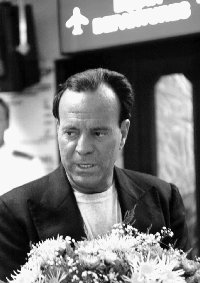Julio Iglesias Provoked Kyivans to Respond in Kind

His other noble gesture that night was fading into the background and using his voice as a soft accompaniment for dancing couples showing remarkable plasticity and fiery temperament. The two-hour concert (unfortunately delayed for an hour while the maestro practiced and audio equipment was adjusted) kept the audience in suspense, because Iglesias offered a program best described as a reciprocity test. He masterfully provoked the listeners to join him in every number, trying to tune in that band of sincere reciprocal love for the lyrics, music, and feelings. The Kyivans preferred to clap their hands louder and louder, whistling, laughing, shouting bravo, encoring the singer, but few if any sang along.
The outstanding singer offered his audience not a dry academic concert but something akin to an intimate rendezvous, a vocal dialogue with each and every listener. Not all in the audience raised on mass-traditional shows appeared ready to accept this approach.
Before the concert started one could hear whispered questions everywhere,
"Will it be soundtrack or live?" And the Iglesias started singing and his
bewitching range, from vague pianissimo to the tremulous upper A, almost
convinced the public it was live. There was one number, however, which
opened a wide gap between the performer and his audience: Iglesias sang
a song in memory of his parents, against a slowly lowering curtain with
a picture of postwar ramshackle streets in his native city, with old linen
hung out to dry, peeling plaster, and doors torn from their hinges. He
sang nostalgically about a childhood lost forever and the audience saw
the horrors of devastation, something they all see every day but a short
walk from that very Palace of Culture.
Выпуск газеты №:
№28, (1999)Section
Culture





